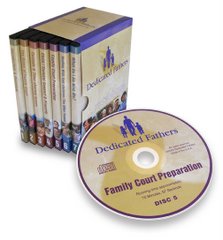DIVORCE MEDIATION (Part 2)
Voluntary Mediation
Part 2 of an ongoing article on Divorce Mediation
By: Marvin Chapman & Dedicated Fathers
www.dedicatedfathers.org
www.unitedfathers.org
Voluntary divorce mediation is a process in which a skilled intermediary helps couples arrive at a mutually satisfactory and amicable agreement without judicial interference through effective communication, exploration of viable options and alternatives, negotiations and compromise. It is a problem solving process in which parents are encouraged to be open and direct in their conversation styles to lessen the chance of misunderstandings and distortions.
The divorce mediation process facilitates a change in parental interactions from the competitive and destructive win-lose mentality of the adversarial system, to a more cooperative problem-solving process. Underlining the success of the mediation process is a set of beliefs:
The belief that there is a mutually acceptable solution to every situation;
The belief that both parents desire a mutually acceptable solution;
The belief that cooperation instead of confrontation will produce mutually acceptable solutions;
The belief that both parents are valuable and have insights and notions which are worthy to be heard and considered; and
The belief that some solutions will need to transcend both parents special interests and concerns because those solutions are better for the restructuring family as a whole.
A divorce mediator sees the family as being in a restructuring process, where all parties are going through a reorganizing life event and simply need assistance in coming up with their own solutions. Not surprisingly, research has found that parents are much more likely to follow their own mediate settlement plan than parents who try to settle their differences through the adversarial system.
Mediation allows for the shift of attention from past relationship issues to current and future custodial and parenting plan issues. It provides parents the opportunity to resolve their issues among themselves without the adversarial process tearing them apart emotionally and financially.
The mediation process typically has five (5) phases which follow below:
First Phase: Initially there are the obligatory introductions and a basic orientation to the mediation process and procedures, the setting of ground rules and the outlining of initial joint goals. During this First Phase the nonthreatening environment boundaries are established. It is during this First Phase that the divorce mediator joins with both parents and establishes trust with each of them.
Second Phase: During this phrase the parties start sharing relevant information about their specific issues. This disclosure process allows the mediator to understand the family dynamics and the level of family functioning. During this stage, the wants, needs, desires and goals of both parents are presented and some explanations allowed as to why those issues are so important to that parent.
Third Phase: This is where the real work (the art of mediation as I call it) truly begins. During this phase the parties start working through issues, practice active listening, learn to compromise, and learn to negotiate without losing their personal power.
Fourth Phase: During this phase, the initial agreements are drafted into tentative agreements for both parents to visually see what their agreements look like on paper in legalese (court language). These initial agreements are then discussed and defined further.
Fifth Phase: During this final phase the divorce agreement is reviewed and approved by the respective attorneys, refined and modified as needed and then finalized by the parents.
Mediation will work for motivated parents. Parents who do not want a third disinterested party (the judge) to make decisions about their lives and the lives of their children. However, it also takes a fairly mature parent to actually come to an agreement. Putting aside hurt feelings and the desire to get even, not attempting to pay back the other parent for their perceived wrongs, and other such feelings and notions must be put on the back burner for mediation to work. For those who can make mediation work, it is far better than allowing a disinterested and totally uninvolved judge from making so many serious decisions about your family and your restructuring process.
Divorce mediation will typically save you a lot of money in attorney fees and time off work for court appearances (many mediating sessions are done in the evenings, after normal working hours). It will also save on the emotional and other stressors that typically go along with the adversarial process.
Mediation is part education. In many cases you and the ex will learn new ways of communicating and new ways to work out problem areas - ways which will assist you is settling future disputes without the need for the adversarial court process. As stated earlier, studies have also shown that mediated agreements are more likely to be followed by both parents and therefore less disruptions for the children, now and into the future.
Mediation is generally accepted as being successful to the extent it results in a voluntary settlement which is accepted as equitable by both parties, their attorneys and the mediator.
By: Marvin Chapman
www.dedicatedfathers.org
Set your self up for success!
Order Dedicated Fathers Today!
Tuesday, February 6, 2007
Divorce Mediation part 2
Posted by
Dedicated Father
at
12:42 PM
![]()
Labels: child custody, children, collaborative divorce, court case, divorce, family court, fathers rights, legal, mediation
Subscribe to:
Post Comments (Atom)



















1 comment:
Thanks for sharing this post with us!
divorce mediator
san francisco divorce lawyers
Post a Comment